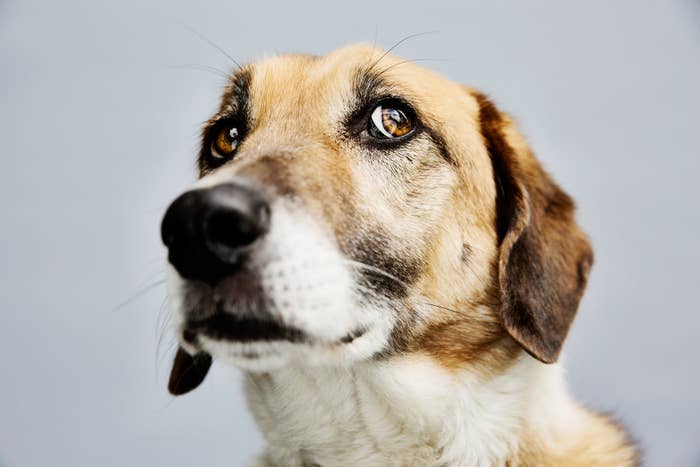
As cases of monkeypox in the US grow, it isn’t totally unreasonable to wonder what risks, if any, our furry friends face as they hunker down at home with their infected owners.
Until recently, it wasn’t clear if any dogs or cats had contracted monkeypox from people, but humans can spread the virus to animals in general via petting, cuddling, sharing sleeping areas and food, and kissing.
Now, a case report published Aug. 10 in The Lancet suggests that human-to-dog transmission is possible, with the first documented infection occurring in Paris.
Twelve days after its owners started showing monkeypox symptoms, including skin lesions and rashes, a healthy 4-year-old Italian greyhound developed its own lesions on its abdomen and anus. Skin swabs proved the dog was positive for monkeypox, according to the report, and that it likely contracted the virus while sleeping in its owners' bed.
It's unclear if the dog has since recovered, but the researchers said more study is needed to better understand how this virus might affect pets and what isolation protocols are necessary to keep pets safe from infection altogether.
Dogs and cats can contract other orthopoxviruses, too, such as the vaccinia virus, which is used in the smallpox/monkeypox vaccines, but this isn’t a concern at the moment.
It’s unknown if less conventional pets like gerbils, guinea pigs, and hamsters can become infected with the virus. The CDC says domestic adult rabbits can “possibly” be infected, as well as mice and rats. Chinchillas and hedgehogs, other less popular pets, can catch monkeypox.
Monkeypox is not endemic in the US, meaning it doesn’t naturally circulate in animals such as rodents like it does in Africa, where the virus occasionally jumps to humans who are bitten or scratched by them.
The last time pets caught monkeypox in the US was in 2003 when domesticated prairie dogs were housed with imported rats and dormice that had the virus; about 70 people got sick in the Midwestern US as a result.
Before the new case report was published, Dr. Katherine Quesenberry, chief medical officer at the Schwarzman Animal Medical Center in New York, had said there was no evidence that suggested dogs and cats are susceptible to monkeypox "or could even serve as a reservoir." However, "that doesn't mean that the risk is zero, but it just is very unlikely that that would happen.”
Carlos Romero, a professor emeritus in the department of infectious disease and immunology at the University of Florida College of Veterinary Medicine, said it’s highly unlikely if not impossible that your pet could get monkeypox while out on a walk or stroll through the park.
Still, infected people are better off taking precautions around their pets to minimize potential spread because it’s not clear how common human-to-dog (or cat) transmission could become.
“The information we have on what monkeypox does to pets in this country is not there,” Romero said. “It’s a big question mark but it’s a cause of concern, and potentially it is possible because of what we have seen in the past with other species.”
What to do with your pets if you get monkeypox
To err on the side of caution, people with monkeypox should avoid contact with pets, as well as wildlife, to prevent spreading the virus, the CDC and experts we spoke to said. You should also keep them away from any of your bandages or body fluids if you have monkeypox.
If you are the only one available to care for your pets, it’s best to wash your hands before and after touching them. To be extra careful, you can cover any rashes or lesions with long sleeves, long pants, or gloves. The CDC also suggests wearing a mask around your pets; although the virus spreads primarily via skin-to-skin contact, it can also be found in respiratory droplets and saliva.
Pets should stay in another home if possible until you recover in the event you didn’t have close contact with them.
Before welcoming your pet back home, make sure to disinfect any laundry, bedding, towels, toys, or food bowls you may have touched that they will come into contact with.
Romero said monkeypox is a very “hardy virus,” and that it’s difficult to destroy because it’s particularly resistant in different environmental conditions. “It could lie on the ground protected for weeks, different from the coronavirus which in a matter of minutes is destroyed.”
The CDC says researchers have found that live monkeypox virus survived inside an infected person’s home for 15 days after they left. Studies also show that other related orthopoxviruses can survive in homelike settings for weeks or months, and that the viruses can live longer on porous materials like bedding and clothing than nonporous ones like plastic, glass, and metal.
With that said, the virus is sensitive to soaps, disinfectants, detergents, and other cleaning products, the CDC says. So a simple wipe down or wash in the laundry should destroy it.
What to do if your pet is exposed to monkeypox
If your pet is exposed to monkeypox, the CDC advises they stay home and away from other people and animals for at least 21 days.
Some people, including those who are pregnant, immunocompromised, caregivers to young children, or have a history of atopic dermatitis or eczema, should not care for an animal that was exposed to monkeypox because they have a high risk of severe disease.
And if it wasn’t already obvious, don’t wipe or bathe your potentially infected pet with chemical disinfectants, hydrogen peroxide, alcohol, hand sanitizer, wipes, or other potentially dangerous cleaners not intended for animals.
Experts aren’t sure what monkeypox looks like in dogs and cats, but they suspect symptoms are similar to those in humans and of other infectious diseases, such as:
- Low energy
- Lack of appetite
- Bloating
- Secretions or crust from the nose or eyes
- Lesions or rashes that look like pimples or blisters
- Flulike symptoms like cough, runny nose, fever, and red eyes
If you think your pet has monkeypox, you should call your veterinarian or local health officials so they can investigate the source of infection (if it wasn’t you).
Can humans or pets spread monkeypox to other animals?
We’ve learned during the ongoing COVID pandemic that people can spread the coronavirus to domesticated and wild animals, including lions, deer, tigers, dogs, cats, otters, hyenas, and hippos, in what scientists call “reverse zoonoses.”
Thankfully, human-to-animal COVID spread, as well as animal-to-animal transmission, has not, as far as we know, led to a whole new reservoir where the coronavirus can circulate. However it is logical to at least consider the chances of that happening with monkeypox.
Luckily, experts aren’t convinced we should worry about that.
“That's so remote at this point,” Romero said. “Somebody would have to do something very, very crazy in order to infect wild rodents, and I cannot think of what.”
Quesenberry said she wouldn’t say there’s no risk at all, but there’s no evidence that’s likely to happen in the event monkeypox skyrockets out of control.
As of Aug. 11, there are more than 10,700 monkeypox cases in the US, and 31,700 globally.
UPDATE
This story has been updated to reflect a new confirmed case of human-to-pet monkeypox transmission.
